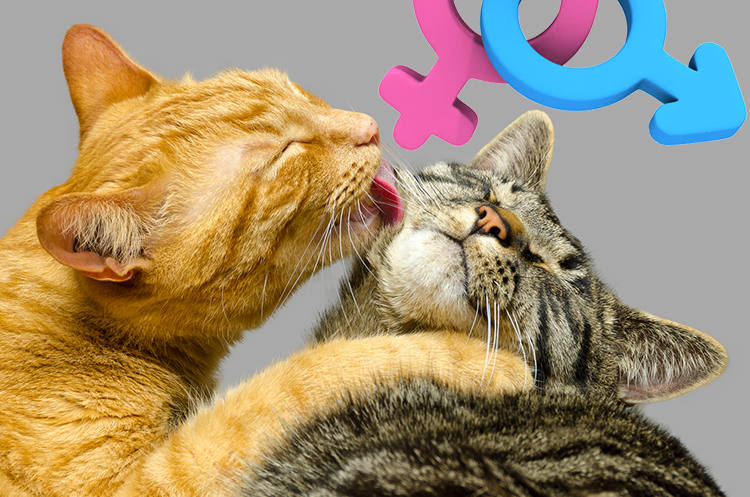We’ve all heard of those sweet stories where a starving Tomcat is allowed inside during a rainy night or a mother-to-be feline settles in under your really-hard-to-reach crawlspace and then – blammo! A new addition to the family. In ideal circumstances, our kitties are given the option to choose us. But for those of us looking to welcome a new feline friend into our home, does gender play a role? Are there really differences between male and female cats?
Who you callin’ Bossypants?
As we all know, the future is female. A Psychology Today report confirmed this, indicating that between 65-80% of cats in American households are female. Therefore it would make sense that female kitties tend to rule the roost. According to Roger Tabor, author of The Wild Life of the Domestic Cat, in feral and domestic circumstances affection and cooperation occur among cat colonies when a female cat or ‘Queen’ bands together with other females to protect their offspring from unwelcome Tomcats.
The Queen also has complete control over her selection of a mate (as it should be). This is the single most important reason to pair male cats with males and females with other females; issues can arise if one or both of the cats were improperly spayed/neutered. We’re talking about spraying here, folks. Both genders will attempt to mark their territory, leading to big fights and a lot more trips to the department store for bedding and pillows.
Who Loves You More
While it’s a nice thought that one might be able to predict whether a specific gender is more likely to satisfy the ‘lap cat’ requirement, such is not the case. Females or Queens might be considered more affectionate because of the mom factor; as female cats are capable of having two to three litters yearly, their world revolves around raising kittens. When a female cat is spayed, however, they can often transfer that nurturing affection to their two-legged family members. The same holds true for male cats; a neutered male cat is less likely to exhibit territorial and aggressive behavior toward other male cats. He is less likely to feel the need to escape and find a mate, relaxing into a more comfortable home life with you.
The same holds true for male cats; a neutered male cat is less likely to exhibit territorial and aggressive behavior toward other male cats. He is less likely to feel the need to escape and find a mate, relaxing into a more comfortable home life with you.
The blogosphere appears to be torn on whether male or female cats are more affectionate. Some research points to affection as a breed-specific trait rather than gender. My friends would beg to differ: after carefully selecting a female ragdoll kitten from a breeder, they were sorely disappointed to find that the disdainful new family member did not, in fact, wish to spend her days showering them with affection. Learn from this lesson and spend some time with your feline before adopting.
Personality Wins Out
It is my opinion that ninety-eight percent of the time cat parents end up with the cat they’re supposed to and not the other way around. My cats tend to complement the opposing sides of my nature – the aggressive, list-making obsessive and the chill, social butterfly.
Unlike me, they both survived extreme situations in their early lives in order to spend their remaining days avec moi – chowing down on crunchies, rolling in catnip, napping, destroying things I care about and teaching me about patience and love. I wouldn’t have it any other way.






